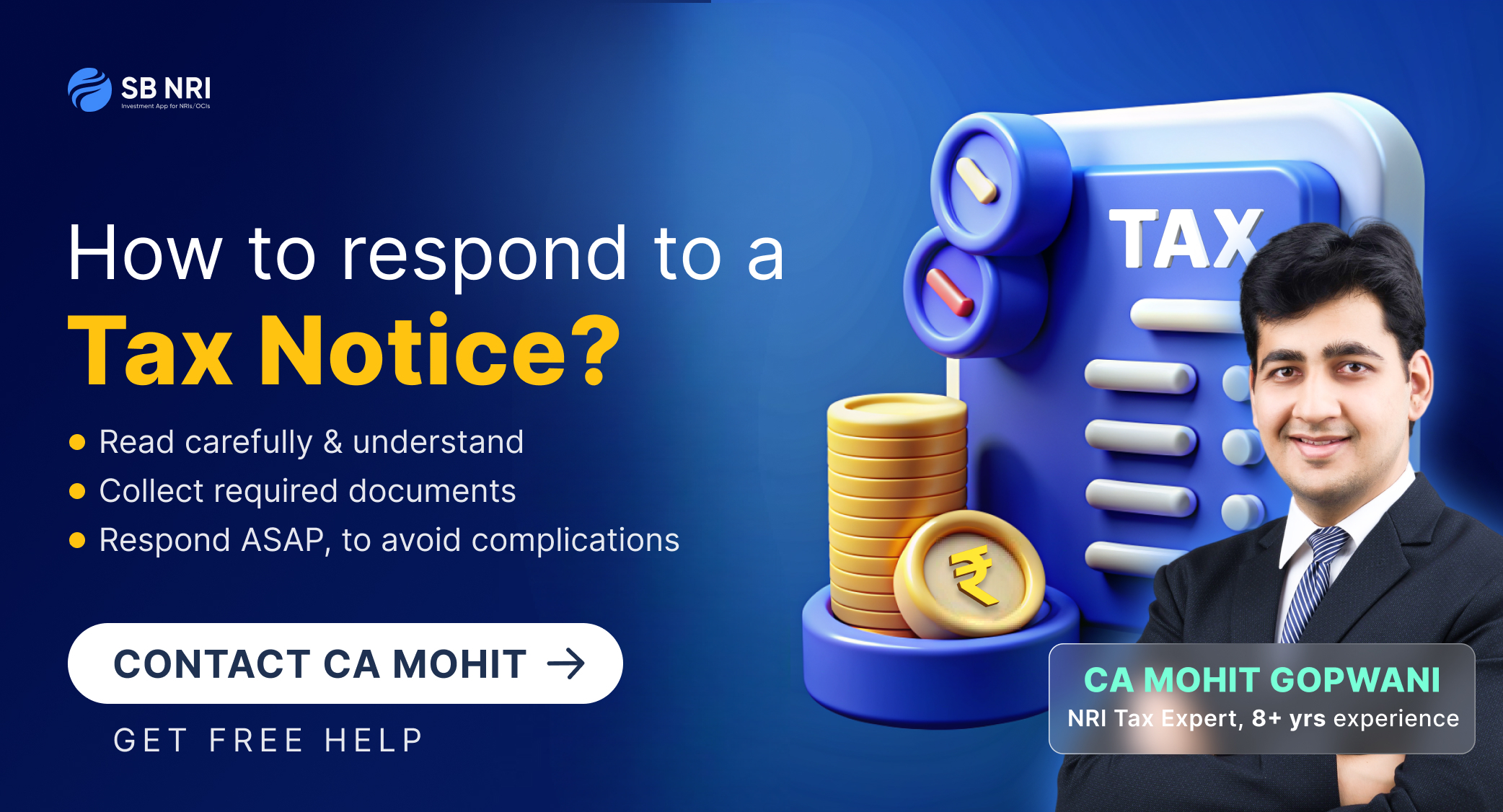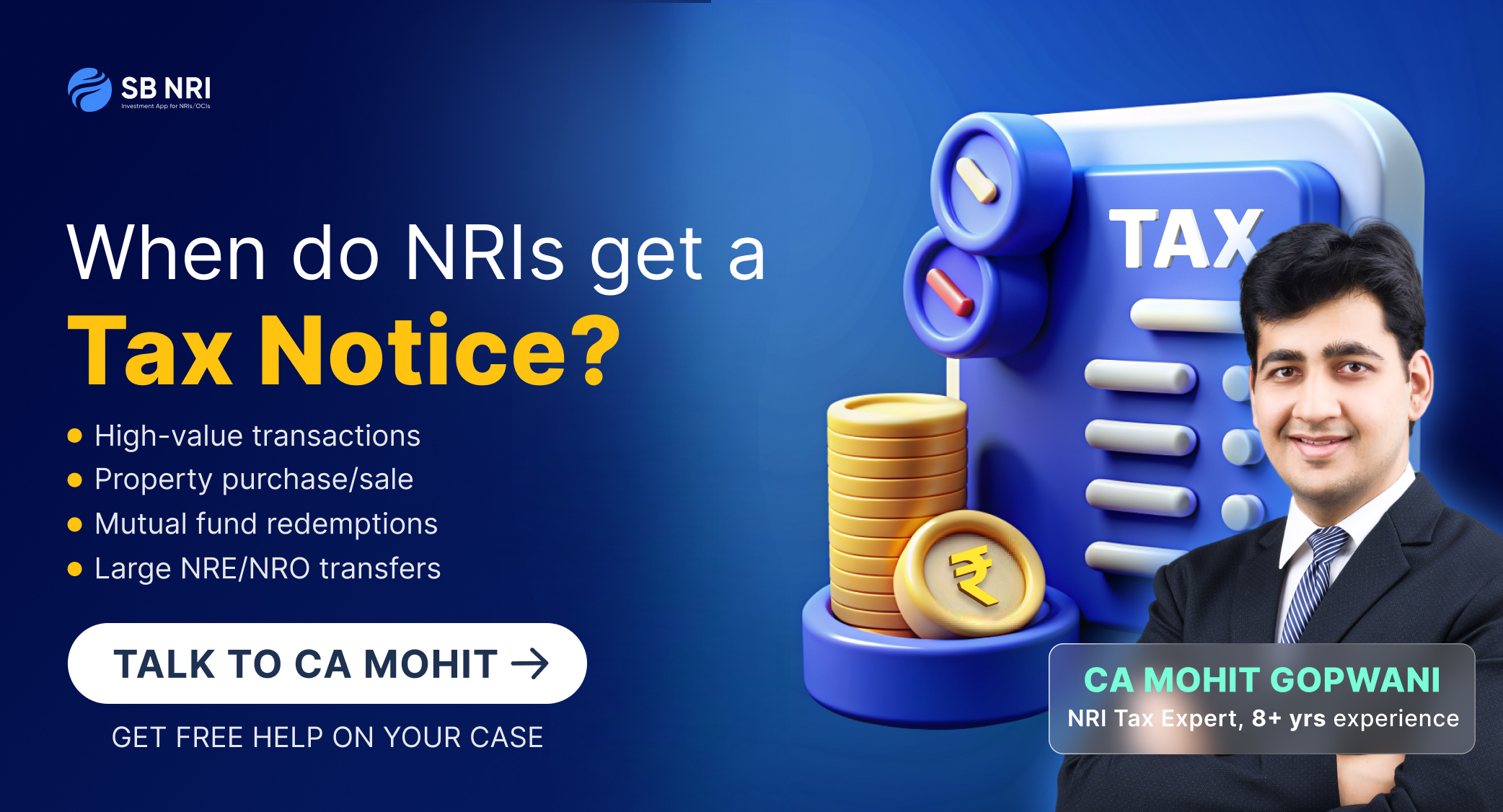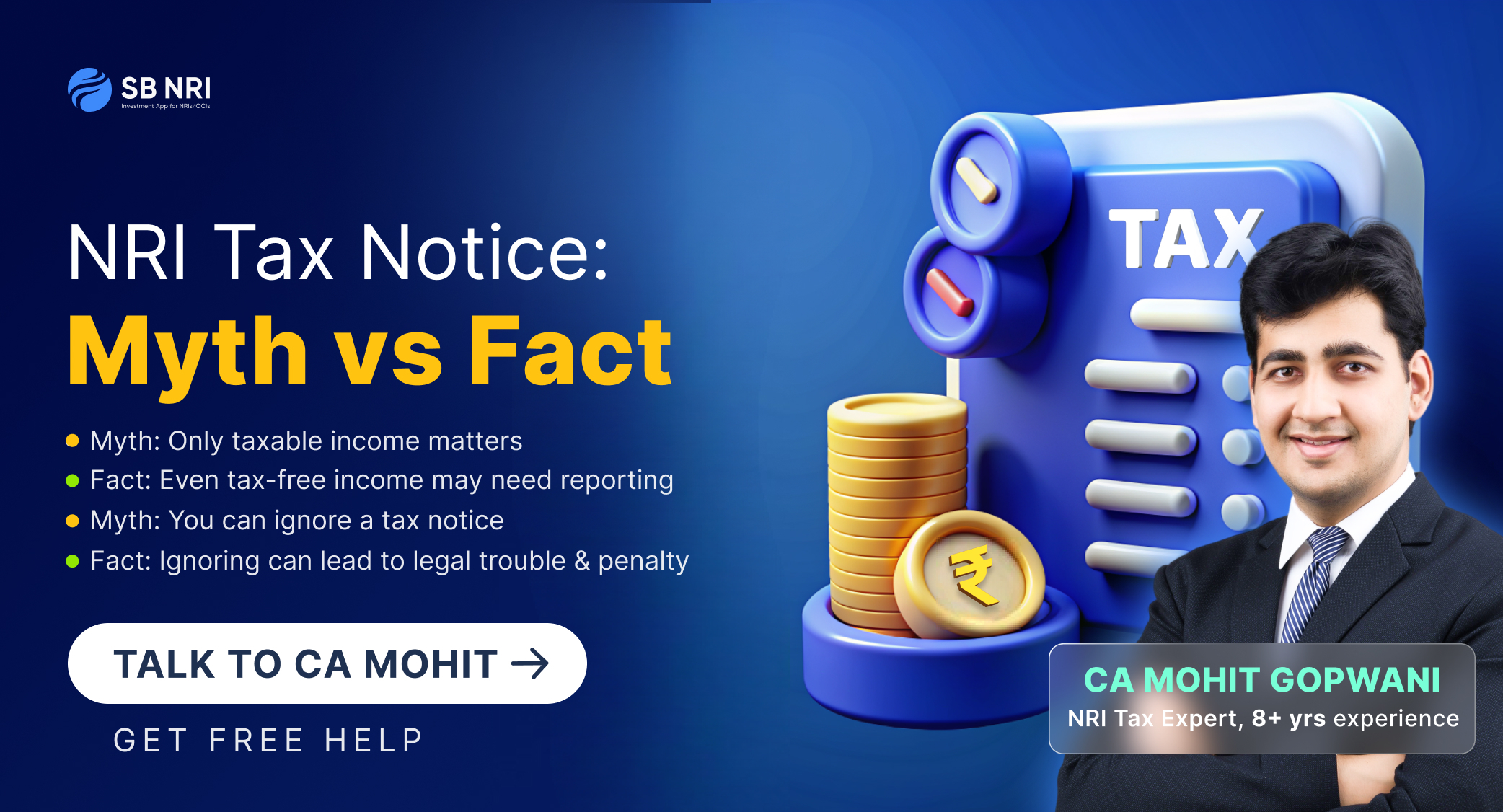Real issues related to Income Tax Notices for NRIs
The government is releasing income tax notices for NRIs. Let’s understand what’s happening.
Rohan Mishra <changed name>, is an NRI living in New York. He recently bought an apartment in Mumbai worth Rs 1.5 crore and made investments in Indian mutual funds. Since his taxable income in India was below the threshold, he did not file an ITR. A few months later, he received an Income tax notice questioning his financial transactions.
Concerned about compliance issues in both India and the USA, Rohan consulted a tax expert. He learned that:
- His property purchase flagged him for scrutiny despite not having taxable income.
- Under DTAA, he needed to ensure proper tax credit claims to avoid double taxation.
- Delaying his response could lead to penalties and reassessment.
Thanks to professional advice, Rohan successfully resolved his tax notice without penalties and ensured future compliance.
In 2024, over 150,000 income tax notices were issued to NRIs regarding high-value transactions in India and the non-filing of income tax returns. This year, too, NRIs who have made significant investments in India from their NRE/NRO/FCNR accounts without filing their returns, are receiving notices.
Just like Rohit, you might be wondering – my income doesn’t even fall within the taxable slab, why am I receiving a notice? Well it differs on a case-to-case basis.

We’ll get to the details in a bit.
But first, let’s break a common myth.
Income Tax Notices for NRIs means penalty?
No, receiving an income tax notice doesn’t mean you are being penalized. Instead, authorities use this as a tool to address any oversight or missing details about your income. If you have made large transactions in India and haven’t filed your returns, don’t be surprised on receiving a notice.
This notice also doesn’t mean you should stop investing in India. There’s no need to panic, but that doesn’t also mean you should ignore it. Ignoring an income tax notice can lead to legal complications. The longer you wait, the more complex, costly, and time-consuming the process can become.
So, what should you do?
The best way is to respond to the notice as soon as possible, but not later than 30 days, or the time limit prescribed in the notice. It will prevent escalation and additional complications.
If you’re unsure about the the income tax notice you’ve received or need help responding to it, don’t hesitate to consult a tax expert. Addressing income tax notices for NRIs promptly is the way-to-go for avoiding unnecessary penalties and ensuring a smooth resolution.

Now back to the question.
Why are you getting notice even when you are out of the tax-slab?
Common reasons for issuing Income Tax Notices for NRIs
If you do not file an Income Tax Return (ITR) in India despite meeting certain conditions, you may receive a notice for Escaped Assessment. To avoid tax scrutiny, NRIs and OCIs must ensure compliance with mandatory ITR filing rules, even if their taxable income in India is below the basic exemption limit of ₹2.5 lakh.
Below are some common reasons why NRIs/OCIs may receive a notice:
Large or High-Value Transactions
- If you purchase property, invest in Indian stocks, mutual funds, or transfer large sums of money to India but do not file a tax return, the Income Tax Department may issue a notice questioning the source of funds and tax compliance.
High-Value Financial Activities
- Deposits in Current Accounts: If you have deposited more than ₹1 crore in one or more current accounts in a financial year.
- Electricity Consumption: If your total annual electricity bill exceeds ₹1 lakh.
- Fixed Deposit: If you have booked/renewed/matured FD value exceeds ₹1 crore.
Failing to File an ITR
- Unreported Taxable Income – If you earn interest from NRO accounts, rental income, capital gains from shares or property, or any other taxable source in India but do not file an ITR, the department may initiate scrutiny.
- TDS Mismatch – If tax is deducted at source (TDS) on your income but does not match your declared income, this discrepancy may trigger an investigation.
- Overseas Assets & Income Non-Disclosure – If you fail to declare foreign assets or overseas income, the tax authorities may suspect tax evasion and issue a notice.
Asset Ownership
- Own immovable property – If you own property in India and earn rental income or sell the property, you must report this in your ITR.
- Hold a primary credit card in India – Having a credit card in India (not an add-on card) with significant transactions can trigger a tax notice.
- Own or lease a motor vehicle – If you own a car or any motor vehicle in India, the department may expect you to file an ITR, particularly if related expenses are high.
Mismatch in Financial Reporting
If your earnings, investments, or assets in India are not correctly reported, the tax department may issue a notice seeking an explanation.
- Failing to report high-value transactions in your ITR, such as property sales, stock investments, or large remittances, the department may conduct an inquiry.
- If your reported income does not align with the details available in your Form 26AS, Annual Information Statement (AIS), or bank records, it can trigger scrutiny.
- If your Indian income exceeds 50 Lakhs, then you are required to report your assets. Failure to do so may result in a tax notice.
NRIs in the USA face additional tax complexities
NRIs who are US citizens or permanent residents have added tax complexities. The US Internal Revenue Service (IRS) requires individuals to report worldwide income if it exceeds $10,000. The Double Taxation Avoidance Agreement (DTAA) between India and the USA helps prevent double taxation but requires careful tax planning and compliance with regulations in both countries.

Also read: Can You Avoid Paying California State Taxes?
Types of Income Tax Notices for NRIs
The Indian Income Tax Department issues various types of notices to Non-Resident Indians (NRIs) and Overseas Citizens of India (OCIs) regarding tax compliance. Here are the key notices you should be aware of:
1. e-Campaign Notices
This notice is issued when an NRI or OCI engages in high-value financial transactions but does not file an Income Tax Return (ITR). The Income Tax Department flags this through an e-Campaign for Non-Filing of ITR to prompt the taxpayer to comply. These notices can be accessed on the IT portal under the e-Compliance section.
2. Notice Under Section 148A – Preliminary Inquiry
This serves as an initial inquiry by the Income Tax Department regarding financial transactions that have been recorded in its system. It requires the recipient to provide an explanation for the transactions in question. If the taxpayer does not respond adequately, the department may escalate the matter and initiate further scrutiny.
3. Notice Under Section 148 – Income Escapement Scrutiny
If the department suspects that an NRI/OCI has not reported significant financial transactions for a particular financial year and did not file an ITR, it may issue a Section 148 notice. This is an official assessment proceeding requiring the taxpayer to file a return for the concerned year. Ignoring this notice can result in penalties and additional tax liabilities.
4. Scrutiny and Detailed Questionnaire Under Section 142(1)
This notice is issued when a scrutiny or assessment proceeding has been initiated against an NRI/OCI. It includes a detailed questionnaire seeking clarification on the individual’s financial transactions. The response must be submitted within the stipulated deadline, and failure to comply may result in heavy penalties and additional tax burdens.
What to do after receiving an Income Tax Notice?
If you receive a notice, follow these steps:
- Stay Calm: Remember, receiving a notice does not mean you are being penalized.
- Assess the Notice: Understand why it was issued and the deadline for response.
- Gather Documents: Collect your previous tax returns, bank statements, and transaction details.
- Respond Promptly: Submit an explanation and supporting documents within 30 days.
- Consult a Tax Expert: If you are confused, contact a tax expert. Professional guidance ensures a smooth resolution and prevents future issues.
- Do not Ignore it: Ignoring a tax notice can lead to reassessment, penalties, and even legal action. Responding on time and seeking expert help is the best course of action.
Understanding tax regulations across multiple countries can be complex. If you have received a notice or want to prevent future tax complications, consult our expert tax advisors today. They will guide you through the process, ensuring compliance and minimizing tax liabilities.

FAQs
Q: Why am I receiving a tax notice when I have no taxable income?
A: Large transactions or financial mismatches can trigger scrutiny, even if no tax is due.
Q: What should I do after receiving an income tax notice?
A: Respond within the given timeframe and provide relevant documentation.
Q. How to Avoid Tax Notices?
- File ITR on time (before 31st July for NRIs).
- Declare all Indian income (including rental income, dividends, etc.)
- Check Form 26AS to ensure TDS deductions match your return.
- Avoid high-value cash transactions that may trigger scrutiny.
- Use DTAA benefits to avoid double taxation.
- Update FEMA Residential Status with your bank to avoid excess TDS on deposits.
NRIs and OCIs must ensure that they file their ITR on time, report all taxable transactions, and respond promptly to any notices to avoid penalties. Regularly checking the Income Tax e-filing portal for updates can help prevent compliance issues.
Q: How can the DTAA help me avoid double taxation?
A: The DTAA allows NRIs to claim tax credits and avoid paying tax twice on the same income. India has Double Taxation Avoidance Agreements (DTAA) with over 90 countries. NRIs can use DTAA to:
- Reduce TDS rates on interest/dividends.
- Avoid paying tax twice on the same income.
- Claim Foreign Tax Credit (FTC).
Example: DTAA between India and the USA allows NRIs to pay tax only in one country for interest earnings.
Q: Do I need to file an ITR even if my income is below the taxable limit?
A: Filing is recommended if you have large transactions, investments, or financial interests in India.
Q: Can I ignore the notice if I think it was sent by mistake?
A: No. Ignoring the notice can lead to hefty penalties and further legal action.
Q: What happens if I miss the deadline to respond?
A: Your case may be escalated, leading to reassessment, fines, and additional scrutiny.
Q: How can a tax expert help me when I receive an income tax notice?
A: A tax expert can analyze your case personally, ensure compliance, and guide you through the response process.



